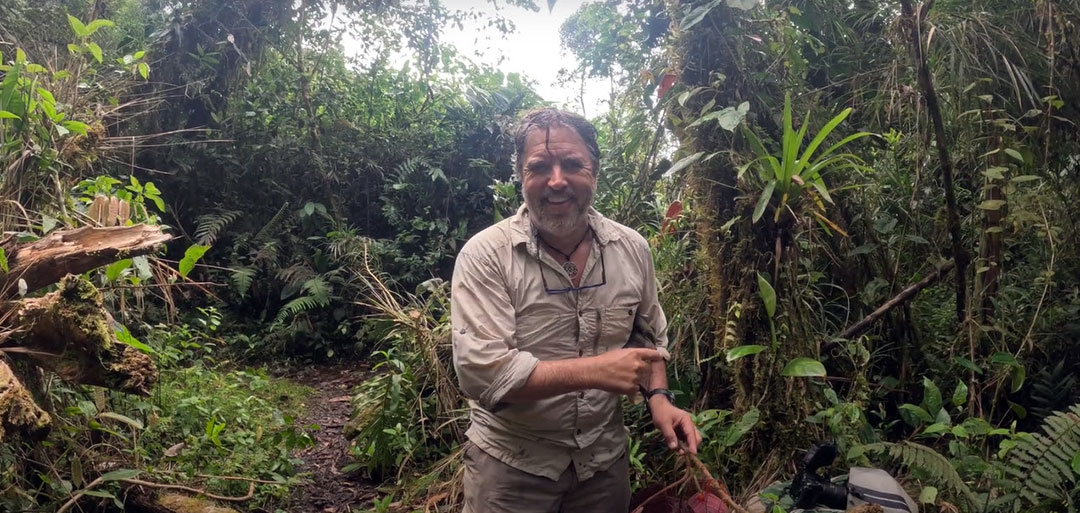
“Ranger” John Clark’s summers at Agawam launched a lifelong passion—and accomplished career—in plants and the natural world.
In the summer of 1984, I earned the Senior Ranger award at Camp Agawam, a defining experience that shaped the course of my life. This award is not easy to achieve. Like the topmost award in many Agawam activities, it requires deep commitment and can take multiple summers for a camper to accomplish. Senior Ranger is the pinnacle of achievement, conveyed after campers have earned Range Partner, Range Guide, and Ranger.
The Ranger Trail essentially teaches outdoor living skills. Agawam’s curriculum promotes a skills-based approach to learning about nature, from fire-building and orienteering to first aid and cooking. While each requirement develops essential outdoor abilities, one challenge stood out above the rest—identifying every tree, fern, and flower on the camp’s property. This task, professionally referred to as a “floristic inventory of vascular plants,” seemed daunting at the time but became the spark that ignited a lifelong passion for plants and the natural world, eventually leading me to a career in botany.
Personal Experience at Camp Agawam
At 14, I was already captivated by field guides and plant identification. As I worked through the flora of Camp Agawam, I had no idea that this seemingly simple activity would set the foundation for my future career. The thrill of successfully identifying a species in the field planted a seed that would later bloom into a full-fledged dedication to the study of botany. After high school, I went on to study forestry at the University of Vermont, where my interest in plants flourished further. My passion deepened during my service in the U.S. Peace Corps, where I had the opportunity to document the flora of a critically endangered rainforest in northwestern Ecuador. This project led to the discovery of more than 40 new species to science, and our findings played a key role in the establishment of a national park.
“Ranger” reflects on where his passion began.
From Camp to Career
That joy I found in recognizing plants fueled a curiosity that has only grown stronger with time. What began with identifying plants at Agawam evolved into researching megadiverse forests across the Neotropics. The skills I developed on the Ranger Trail—observing, identifying, and documenting—became the foundation of a career that has taken me to some of the most remote and least studied ecosystems on the planet. To date, I’ve published hundreds of new species, including four new genera, and authored over 100 peer-reviewed papers. With a Ph.D. in phylogenetics, my research now delves into evolutionary relationships using molecular data, supported by organizations like the National Science Foundation and National Geographic Society. My work has contributed to the scientific discovery and conservation of plant diversity in regions like Haiti, Cuba, the Dominican Republic, Panama, Venezuela, Bolivia, Peru, Ecuador, and Colombia.
Impact of Expeditionary Skills
What sets me apart as a botanist is not just my passion for plants but also the expeditionary skills I honed during my time at Camp Agawam. As both a camper and later the director of the Camp Agawam Trip Program, I drew on lessons from the Ranger Trail and countless outdoor trips. Skills like effective packing, itinerary planning, maintaining hygiene in the wilderness, and mastering white-gas-two-burner Coleman stoves proved indispensable during my research expeditions in Latin America. Camp Agawam trips and the Ranger Trail fostered self-sufficiency, discipline, and a deep appreciation for the natural world. Growing up in suburban Princeton, New Jersey, I doubt I would have developed the same passion for the outdoors without these experiences. Dave Mason, one of Agawam’s legendary directors, encouraged me to expand my wilderness skills and encouraged me to take courses with the National Outdoor Leadership School (NOLS), where I later briefly worked as a mountaineering instructor.
Conclusion
Today, I am a research botanist at Marie Selby Botanical Gardens, where I focus on promoting plant diversity through research, outreach, and education. My career has come full circle, rooted in the same love for the outdoors that I discovered as a camper at Agawam. The lessons I learned there have laid the foundation for a fulfilling life dedicated to the exploration and conservation of plant biodiversity.
Camp Agawam continues to shape the lives of young explorers. When I recently visited, Everett Calhoun (now “Ranger”) presented me a list of 123 accurately identified plants—more than double my modest list of 60 species in 1984. This evolution in the program is a testament to how the Ranger Trail continues to challenge campers to exceed expectations. I owe much of my success to the dedicated Agawam Ranger Trail staff, who encouraged me to explore and excel.
As I look back on my journey, I remain committed to fostering a love for the outdoors in others. Whether through directing programs for students or leading trips for Agawam campers, I strive to share the wonder and value of biodiversity. The path I started on at Camp Agawam has led to a career I am proud of, and for that, I will always be grateful.
“Ranger” Clark offers a lesson on the Starflower.
“Ranger” Clark applies his skills in the field.
